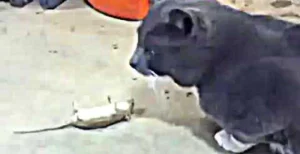You found a mouse in the farthest part of your house but are unsure if it is dead, sleeping, or playing dead. And you probably have cats. You can tell if a mouse is playing dead irrespective of whether its act deserves an Oscar or not. Mice will play dead when they sense a threat and continue to do so until the threat is gone. Nevertheless, this behavior is extremely uncommon though because mice are known to flee whenever they perceive a nearby threat.
How to tell if a mouse is playing dead

To an extent, it could seem difficult to tell whether a mouse is actually dead or just acting dead or even sleeping (most unlikely). To determine the mouse’s actual state, there are a few indications to look out for.
1. The mouse’s appearance
The appearance of the mouse is the first thing you should consider. If the critter appears stiff and unresponsive, it is dead. You should also notice its closed eyes and limp body. If the mouse is playing dead, it will appear relaxed and may even twitch or move slightly. Watch closely, the smart animal may have open eyes and a tense body.
2. Pay attention to its breath
The mouse will not breathe if it is dead. However, if the mouse is pretending to be dead, it should be breathing shallowly and rapidly. It’s also possible for the mouse to hold its breath entirely. Check for breathing by holding the mouse up to your ear, listening for any breathing sounds, or looking at the mouse’s chest for any signs of movement. Do not pick the mouse with your bare hands.
Meanwhile, mice can breathe through their butts, so watch out. Per the American Association for the Advancement of Science, mice can absorb oxygen from tissues in the rectum, though this usually happens during respiratory distress.
3. Check its reaction to other animals
Your pets or other animals will not be interested in a dead mouse. However, they can approach the mouse to investigate whether it is playing dead due to injury or weakness.
4. Overall mouse behavior
You can also tell if a mouse is playing dead by observing its behavior compared to when it is indeed dying. Mice play dead as a defense mechanism, thus, it is likely that the mouse is playing dead if you saw it running away from a predator or in a situation where it was in danger.
Do mice ever play dead?
Mice play dead. When they feel threatened or scared, they play dead as a defense mechanism, which is referred to as faking death or tonic immobility. When a mouse plays dead, it becomes completely still and will resume normal activity once the perceived threat has passed. Playing dead is also referred to as thanatosis or feigned death. It’s a natural reaction to danger triggered by the release of certain hormones such as adrenaline. When a mouse detects a threat, it stops moving and remains completely still to deter predators or other potential threats.
Mice are small and vulnerable creatures frequently preyed upon by larger predators such as cats, snakes, and birds of prey. Thus, playing dead becomes an effective survival strategy since predators are less likely to attack a dead animal. A mouse playing possum will leverage this opportunity to flee later.
If you caught a mouse, it will pretend to be dead since you’re also a predator.
Also, mice can pretend to be dead if they are injured or sick. It plays dead because it is unable to move or defend itself.
How long will a mouse play dead?
A mouse will usually play dead for a short time, usually less than a minute. The duration of this behavior, however, depends on the situation and the individual mouse.
A rodent will simulate the appearance of death when faking it by stopping all movement and remaining completely still. If you caught a mouse yourself and keep watch for hours, it can potentially play dead for hours to avoid being killed.
Some experts say a mouse may play dead for days or even weeks if it is injured or ill because it lacks the energy or physical capacity to move and will only emerge from this condition of faked death when it feels comfortable.
How do you tell if a mouse is actually dead?
If a mouse is actually dead, it won’t move and won’t react to stimuli. Check the mouse to see if it is still breathing by watching its chest for movement. Rigor mortis is another way to determine if a mouse is actually dead. This is a condition whereby the body of the critter becomes rigid.
Also, simply look for stiffness in the mouse’s tail and limbs. If stiff, the poor animal is dead for real. Another factor is that a dead mouse won’t react to stimuli or contact. The mouse won’t respond if you try to move it or touch it.
Lastly, if you detect a potent stench, changes in the color or texture of the rodent’s skin, or the presence of flies or other insects, these are indications that the mouse is dead. If no sign of reflexes when you try to touch the eyes of the mouse, the pupils will not respond, meaning that the poor critter is dead.
Final thoughts
It helps to know if a mouse is playing dead or dead for sure. Dead mice are carriers of diseases such as leptospirosis, hantavirus, and tularemia, typically present in their bodies and feces. Moreover, their bodies can attract other animals that can be harmful to you and your household. For example, pests that feed on carrion, such as snakes, raccoons, skunks, and opossums, will be drawn to the dead body. Likewise, disease-carrying insects like flies, mites, maggots, and ticks will seek out dead mice. So, if the mouse is indeed dead, follow the proper measures to dispose of it or involve professionals.


